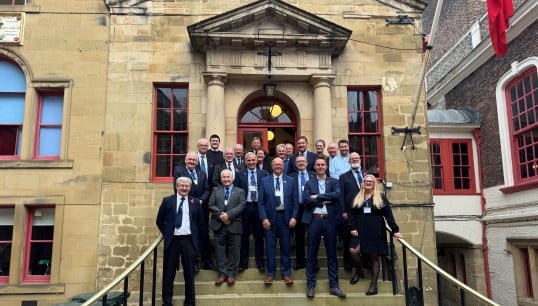NEDSPA: revived deep sea pilots' organisation to tackle unlicensed operators
20 December 2024

A previously inactive organisation for deep sea pilots returned to action with a meeting on 6 October 2024 which discussed ways to ensure professionalism in pilotage − including a suggestion for a centralised database of fully licenced pilots.
The North European Deep Sea Pilotage Association (NEDSPA) resumed with a UK meeting at Trinity House, Newcastle, under the leadership of chairman Captain Kim Sykes, where participants discussed how to tackle the issue of unlicensed deep sea pilots, who pose a serious potential safety risk.
Among the attendees at the meeting were representatives from several pilotage services companies; the UK Maritime & Coastguard Agency; Dutch Rijkswaterstaat (Directorate General for Public Works and Water Management); European Maritime Pilots’ Association; German Federal Waterways and Shipping Administration; and several active deep sea pilots. These included Nautilus deputy vice chair of Council, Captain Henk Eijkenaar − also an ambassador for the confidential safety at sea reporting service CHIRP − who spoke to Telegraph about unlicensed pilots in May 2024. Nautilus International was also represented by director of organising Martyn Gray.
Is your pilot qualified?
During the meeting, all attendees acknowledged the growing problem of unlicensed pilots in the North Sea area and agreed that it was in the best interests of the licensed deep sea pilots to block them from undertaking work for which they are not qualified.
Unfortunately, deep sea pilots are not covered by SOLAS or STCW regulations and it is therefore impossible for the Port State to check whether they are fully licensed.
The attendees discussed other options and agreed that the best way to ensure safety would be to create a simple way for captains and shipowners/operators to verify if a deep sea pilot is fully licenced or not.
IMO Resolution A.1080(28) Recommendation on the Use of Adequately Qualified Deep-Sea Pilots in the North Sea, English Channel and Skagerrak provides a format for checking deep sea pilot licences, but all the pilots at the meeting pointed out that their license had never been checked in practice.
Pilot database
A proposal was made to set up a centralised database containing all fully licensed pilots from relevant countries, to be made accessible to captains, shipowners and operators. Capt Sykes and some of the other attendees have now undertaken to look into this option.
This discussion also prompted the idea of creating a version of the deep sea pilot licence including a QR code that links to the new database. That way, the ship’s master could simply scan the code to check the license of a pilot coming onboard.
Future action
Another meeting will be held during 2025 at Trinity House in Hull to hear about progress on the project and continue NEDSPA’s work.
Tags
More articles
Crisis at sea: the growing threat of 'fake' deep sea pilots
Nautilus Maritime Barometer 2024: changing perceptions of seafaring
Access is now available to Nautilus International's third Maritime Barometer report, which provides fascinating insights into the UK public's perception of the maritime industry.
